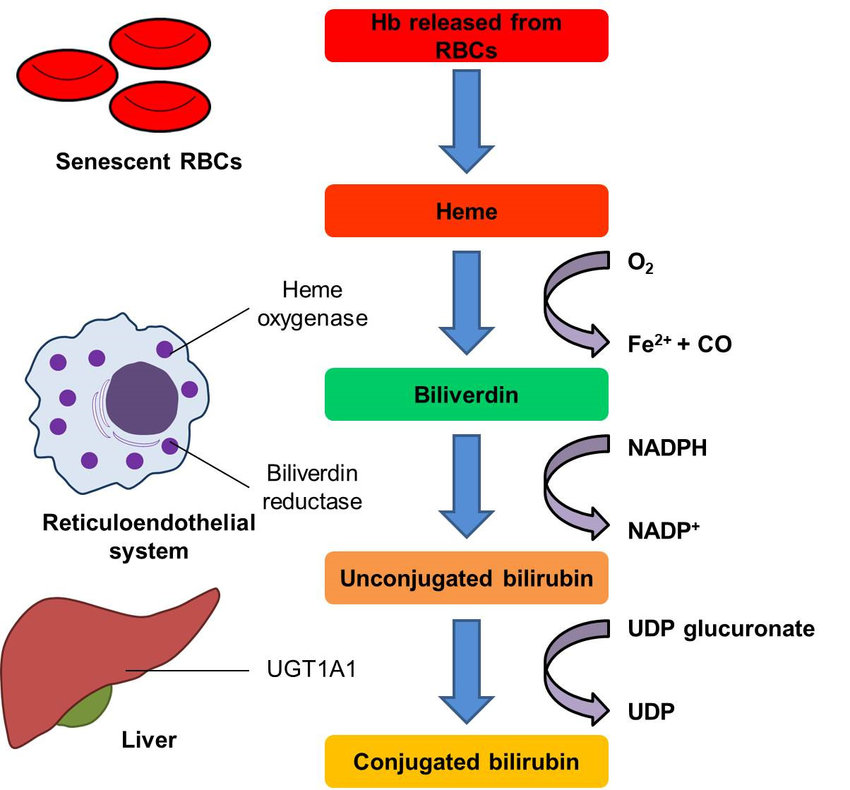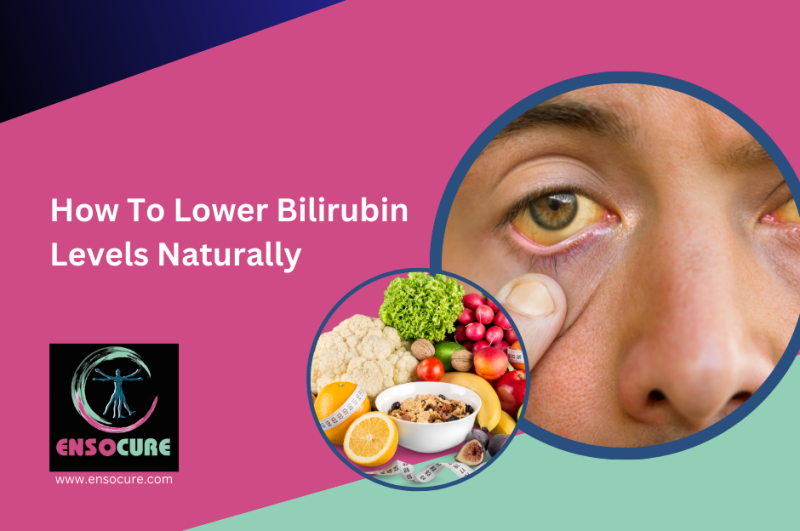Bilirubin is a yellowish substance formed when hemoglobin, which is the protein in red blood cells that carries oxygen, breaks down. The heme molecule in hemoglobin is converted to biliverdin, which is then further broken down into bilirubin. In the bloodstream, unconjugated bilirubin which is not water-soluble binds to a protein called albumin and is transported to the liver. In the liver, bilirubin is conjugated, or modified, to make it water-soluble, so it can be excreted in bile, a fluid that helps with digestion. The liver is the main site for bilirubin metabolism where elevated bilirubin results in conditions like jaundice, and is a symptom of liver disease or an underlying condition. Bilirubin can be reduced by adopting a lifestyle healthy for your liver such as these ways to lower your bilirubin levels naturally.
What is Bilirubin?
Bilirubin is a yellowish-brown pigment produced during the natural breakdown of red blood cells. Hemoglobin, the protein responsible for carrying oxygen in red blood cells, undergoes a series of transformations as it reaches the end of its life cycle. The breakdown of hemoglobin results in the release of biliverdin, which is then converted into bilirubin.

This bilirubin is transported to the liver, where it undergoes further processing. The liver conjugates bilirubin, making it water-soluble and facilitating its excretion through bile into the intestines. From there, it leaves the body through feces. This intricate process is part of the body’s waste elimination system, ensuring the efficient removal of old or damaged red blood cells.
Types of Bilirubin
- Unconjugated bilirubin (indirect bilirubin): The insoluble part of the bilirubin, not conjugated in the liver is called unconjugated bilirubin. It is insoluble in water, but soluble in fat and alcohol. The unconjugated bilirubin has high molecular weight and cannot be filtered through the kidney.
- Conjugated bilirubin (direct bilirubin): The fraction of the bilirubin, conjugated with glucuronic acid in the liver to form bilirubin diglucuronide is called conjugated bilirubin. Conjugated bilirubin can be excreted into the bile and then transported into the small intestine, where it is eventually eliminated from the body in the feces.
High levels of unconjugated bilirubin in the blood result in hyperbilirubinemia, and indicate jaundice, a yellowing of the skin and eyes. One common, cause of elevated bilirubin is Gilbert’s syndrome, a deficiency in an enzyme that helps break down bilirubin. It can only be diagnosed after careful analysis by a doctor.
Elevated levels of conjugated bilirubin in the blood can also be a sign of liver disease, liver injury or obstruction of the bile ducts. Conjugated (direct) bilirubin level can also be elevated by alcohol, infectious hepatitis, drug reactions, and autoimmune disorders.
Optimal Bilirubin Levels
While bilirubin is a natural byproduct of red blood cell breakdown, maintaining its levels within a specific range is crucial for good health. Bilirubin levels are typically measured in milligrams per deciliter (mg/dL), and the total bilirubin concentration includes both direct (conjugated) and indirect (unconjugated) bilirubin.
The optimal total bilirubin level generally falls between 0.3 to 1.9 mg/dL, although these values may vary slightly based on the laboratory and the specific testing method used. Elevated bilirubin levels can lead to jaundice, a condition characterized by yellowing of the skin and eyes, which often indicates an underlying health issue.
- TOTAL BILIRUBIN: 0.1 to 1.2 mg/dL (1.71 to 20.5 µmol/L).
- DIRECT (CONJUGATED) less than 0.3 mg/dL (less than 5.1 µmol/L). I
- NDIRECT (UNCONJUGATED) bilirubin: 0.2 to 0.8 mg/dL.
High levels of bilirubin in the blood can be caused by several factors, including:
- Liver diseases: Conditions that affect the liver, such as hepatitis, cirrhosis, and liver cancer, can cause an increase in bilirubin levels.
- Hemolytic anemia: This is a type of anemia that occurs when red blood cells are destroyed faster than they can be replaced. This can lead to an increase in bilirubin levels.
- Obstruction of the bile duct: A blockage in the bile duct can prevent the liver from excreting bilirubin properly, causing an increase in bilirubin levels.
- Gilbert’s syndrome: This is a genetic condition that affects the liver’s ability to process bilirubin, causing an increase in bilirubin levels.
- Certain medications: Some medications can cause an increase in bilirubin levels, including sulfonamides, rifampin, and chloramphenicol.
- Newborn jaundice: In newborns, high levels of bilirubin can occur because their liver is not fully developed, and they have a higher rate of red blood cell breakdown. This is usually temporary and resolves on its own.
- Exercise: Research shows that exercises can also increase bilirubin levels which means you should not get tested after a tournament or working out.
High bilirubin levels (hyperbilirubinemia) can indicate underlying liver or blood disorders, while low levels may not necessarily indicate a health problem. It’s important to consult with a healthcare provider if you have any concerns about your bilirubin levels. General illnesses that cause high bilirubin can include: abdominal pain or swelling, fever, chest pain, weakness, lightheadedness, fatigue, nausea, vomiting.
How to lower Bilirubin
While you need investigations to find out underlying conditions or medications that could be increasing your bilirubin, here are some natural ways to lower bilirubin.
Hydration
Adequate water intake is essential for overall health and can help in reducing bilirubin levels. Water supports the liver in efficiently processing and excreting bilirubin. Aim for at least eight glasses of water per day, and more if you’re physically active.
Healthy Diet
Fruits and Vegetables: Incorporate a variety of fruits and vegetables into your diet. These foods are rich in antioxidants and fiber, which support liver health and aid in the elimination of waste products, including bilirubin.
- Whole Grains: Choose whole grains over refined carbohydrates. Whole grains provide essential nutrients and fiber, promoting a healthy digestive system.
- Lean Proteins: Opt for lean protein sources, such as fish, poultry, and legumes, to support liver function without overburdening it.
Liver-Boosting Foods
- Turmeric: Curcumin, the active compound in turmeric, has anti-inflammatory and antioxidant properties that may benefit the liver and gall bladder. It should be noted that some research has found excessive use of curcumin supplement might just end up damaging your liver instead.
- Ginger: Known for its anti-inflammatory properties, ginger may help protect the liver. Enjoy ginger in teas, smoothies, or as a seasoning in your meals.
- Citrus fruits: Citrus fruits like oranges, lemons, and grapefruits are rich in vitamin C, which can help protect the liver and support overall health.
- Nuts and seeds: Snacking on nuts and seeds like almonds, walnuts, and chia seeds can provide healthy fats and antioxidants that can help protect the liver.
- Cruciferous vegetables: Cruciferous veggies like cauliflower, Brussels sprouts, and mustard greens besides being a source of fiber are good for your liver. Plus, they contain antioxidants and phytochemicals that may help prevent liver cancer.
- Berries and Grapes: Blueberries, strawberries and raspberries are rich in fiber and contain many antioxidants, including anthocyanins which have been proven to reduce liver damage. However, more evidence is needed in the regard. Grapes contain an antioxidant called resveratrol, which may help prevent further liver damage in people with NAFLD (Non-Alcoholic fatty Liver Disease). Studies show that people with NAFLD who take resveratrol supplements made from grape extract may have less inflammation.
- Beans: The American Liver Foundation recommends replacing saturated fat and red meat with beans, lentils, and chickpeas. These legumes are low in saturated fat and are a source of fiber that protects liver health.
- Coffee and Tea: Coffee is good for liver health, but avoid adding milk and sugar. Coffee has anti-inflammatory and antioxidant properties. Studies show coffee drinking is associated with lowered levels of bilirubin, gamma-glutamyl transferase, alanine-amino transferase, and alkaline phosphatase. Tea, mainly green tea has been proven by studies to lower the lower the risk of NAFLD, however it must be noted that green tea supplements in excess has been linked to liver damage.
Maintain a Healthy Weight
Obesity can contribute to liver dysfunction and elevated bilirubin levels. Adopting a balanced diet and engaging in regular physical activity can help maintain a healthy weight and support liver function.
Limit Alcohol Intake
Excessive alcohol consumption can strain the liver and contribute to elevated bilirubin levels. If you consume alcohol, do so in moderation. For individuals with liver concerns, it may be advisable to abstain from alcohol entirely.
Regular Exercise
Physical activity promotes overall health, including liver function. Aim for at least 150 minutes of moderate-intensity exercise per week. Consult with a healthcare professional before starting a new exercise routine, especially if you have existing health conditions.
Herbal Supplements
Certain herbs, such as milk thistle and dandelion root, have been traditionally used to support liver health. However, it’s crucial to consult with a healthcare professional before incorporating herbal supplements into your routine, as they may interact with medications or have contraindications.
Manage Underlying Health Conditions
Addressing underlying health issues, such as hepatitis or hemolysis, is crucial for managing bilirubin levels. Work closely with healthcare professionals to develop a comprehensive treatment plan tailored to your specific needs.

